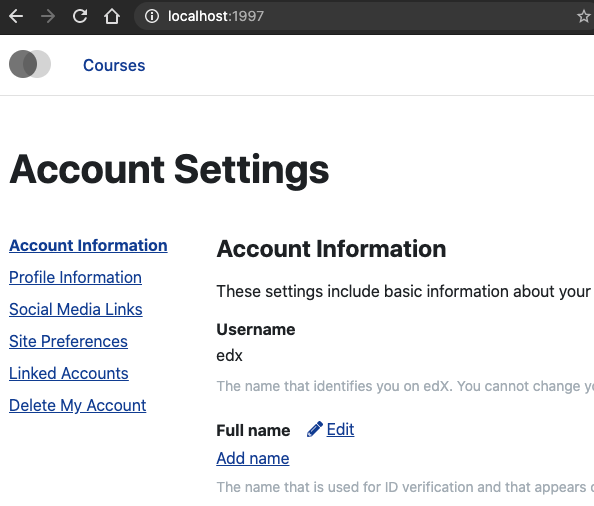This is a micro-frontend application responsible for the display and updating of a user's account information.
What is the domain of this MFE?
In this MFE: Private user settings UIs. Public facing profile is in a separate MFE (Profile)
- Account settings page
- Demographics collection
- IDV (Identity Verification)
This MFE is bundled with Devstack, see the Getting Started section for setup instructions.
Install Devstack using the Getting Started instructions.
Start up Devstack, if it's not already started.
Log in to Devstack (http://localhost:18000/login )
Within this project, install requirements and start the development server:
npm install npm start # The server will run on port 1997
Once the dev server is up, visit http://localhost:1997 to access the MFE

This MFE is configured via environment variables supplied at build time. All micro-frontends have a shared set of required environment variables, as documented in the Open edX Developer Guide under Required Environment Variables.
The account settings micro-frontend also supports the following additional variable:
SUPPORT_URL
Example: https://support.example.com
The fully-qualified URL to the support page in the target environment.
PASSWORD_RESET_SUPPORT_LINK
Examples:
https://support.edx.org/hc/en-us/articles/206212088-What-if-I-did-not-receive-a-password-reset-message-mailto:support@example.com
The fully-qualified URL to the support page or email to request the support from in the target environment.
ENABLE_ACCOUNT_DELETION
Example: 'false' | '' (empty strings are true)
Enable the account deletion option, defaults to true.
To disable account deletion set ENABLE_ACCOUNT_DELETION to 'false' (string), otherwise it will default to true.
Furthermore, there are several edX-specific environment variables that enable integrations with closed-source services private to the edX organization, and are unsupported in Open edX. Enabling these environment variables will result in undefined behavior in Open edX installations:
COACHING_ENABLED
Example: true | '' (empty strings are falsy)
Enables support for a section of the micro-frontend that helps users arrange for coaching sessions. Integrates with a private coaching plugin and is only used by edx.org.
ENABLE_DEMOGRAPHICS_COLLECTION
Example: true | '' (empty strings are falsy)
Enables support for a section of the account settings page where a user can enter demographics information. Integrates with a private demographics service and is only used by edx.org.
DEMOGRAPHICS_BASE_URL
Example: https://demographics.example.com
Required only if ENABLE_DEMOGRAPHICS_COLLECTION is true. The fully-qualified URL to the private demographics service in the target environment.
Example build syntax with a single environment variable:
NODE_ENV=development ACCESS_TOKEN_COOKIE_NAME='edx-jwt-cookie-header-payload' npm run buildFor more information see the document: Micro-frontend applications in Open edX.
None
We don't have anything planned for the core of the MFE (the account settings page) - this MFE is currently in maintenance mode. There may be a replacement for IDV coming down the pipe, so that may be DEPRed. In the future, it's possible that demographics could be modeled as a plugin rather than being hard-coded into this MFE.




